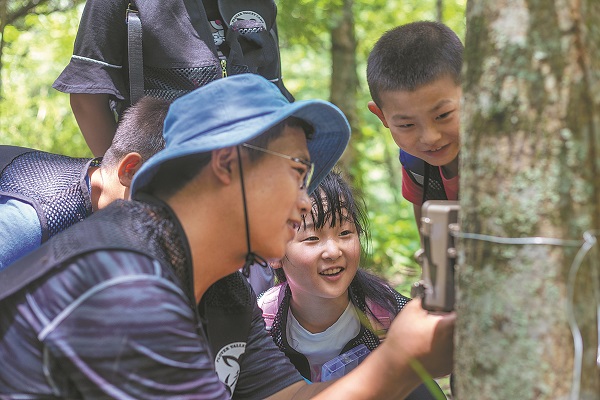Nature, natural produce lend Jiulong Peak appeal


Du Minghui, with the Jiulong Peak nature reserve in Anhui province, shows students on a study tour how to use an infrared camera on June 6. [Photo/Xinhua]
HEFEI — On an early summer day in the enchanting landscape of Jiulong Peak, deep in Anhui province, Du Minghui was taking a group of 20 students on a study tour.
With the symphony of birdsong echoing through the air, they embarked on the journey, weaving their way through the forest to unlock the secrets and wonders of wildflowers and trees.
"Our tours are primarily centered around nature education. They aim to allow children to forge a deep connection with nature and gain a profound understanding of it by sharing knowledge of the animals and plants in the mountains," said the 35-year-old, adding that the participants were mainly primary and secondary school students.
Throughout the tour, students not only had the opportunity to acquire essential survival skills in the wild, such as learning to tie knots and building simple stretchers, but also had the privilege of accompanying patrollers on their rounds and gaining valuable insight into how to use infrared cameras.
Situated in the southwestern region of the majestic Huangshan Mountains, a UNESCO World Heritage Site, the Jiulong Peak provincial nature reserve encompasses an area of 27.2 square kilometers and boasts an impressive forest coverage rate of 97 percent.
Within its lush expanse, nature thrives, sheltering a remarkable array of biodiversity. The reserve is home to 42 rare and protected plant species, as well as 35 animal species under State protection, making it a haven for environmental conservation and exploration.
In recent years, the reserve has forged partnerships with scientific institutions, capitalizing on its advantages to develop educational tours and ecotourism.
"During the first three days of June, my colleagues and I hosted three groups of students. With summer vacation approaching, we anticipate an influx of children to experience and appreciate the enchanting beauty of nature," Du said.
The surge in educational tours is closely linked to the improved environment of the mountains.
Over the years, the reserve has allocated an annual budget of approximately 2 million yuan ($281,400) to environmental protection, including the establishment of intelligent monitoring platforms across the wilderness and the strategic placement of infrared cameras that now cover every corner of the reserve.
"With the improving environment, we are delighted to witness the return of animal species that had been absent for years. Just recently, I saw an Elliot's pheasant, which is a nationally protected bird," Du said.
He explained that in the past four years, the reserve has captured nearly 350,000 images of wild animals. Notably, footage has revealed the resurgence of species such as golden eagles and sika deer that have been absent for an extended period of time. The photos have become an integral part of study tours, offering an immersive introduction to the diverse wildlife found in the reserve.
Within the picturesque Jiaocun township at the foot of Jiulong Peak, the lives of many residents have been transformed as a result of the boom in educational tours and ecotourism. Among them is Cheng Shenggui, a 50-year-old entrepreneur who has found success in the homestay business.
Sensing the potential presented by the development of tourism, Cheng returned to his hometown in 2016 and refurbished his abandoned farmhouse, transforming it into a welcoming homestay that attracts tourists from across the country.
"In addition to study tour participants, countless visitors are drawn to Jiulong for its beauty, and they often stay for many days," Cheng said, adding that during the peak holiday seasons, securing a room at his homestay requires making a reservation nearly a month in advance.
The homestay gives Cheng a stable annual income of around 700,000 yuan.
"In addition to accommodations, local specialties are another source of income," Cheng said. In collaboration with nearby farmers, he sells honey and other produce, delighting tourists with the tastes of the region.
Since 2018, the Jiulong Peak provincial nature reserve has generated over 5 million yuan through tours and sales of agricultural produce.
"We believe that as long as we continue improving and preserving our environment, tourists will continue to flock to this remarkable destination," Cheng said.
Xinhua
MOST POPULAR
- 1 Guangdong remains top foreign investment destination in China
- 2 Boao establishes zero-carbon zone in pursuit of sustainable development
- 3 Countermeasures against foreign sanctions empowered
- 4 Things to know about Boao Forum for Asia Annual Conference 2025
- 5 China introduces new measures to facilitate travel, residency for HK, Macao, Taiwan residents on mainland







